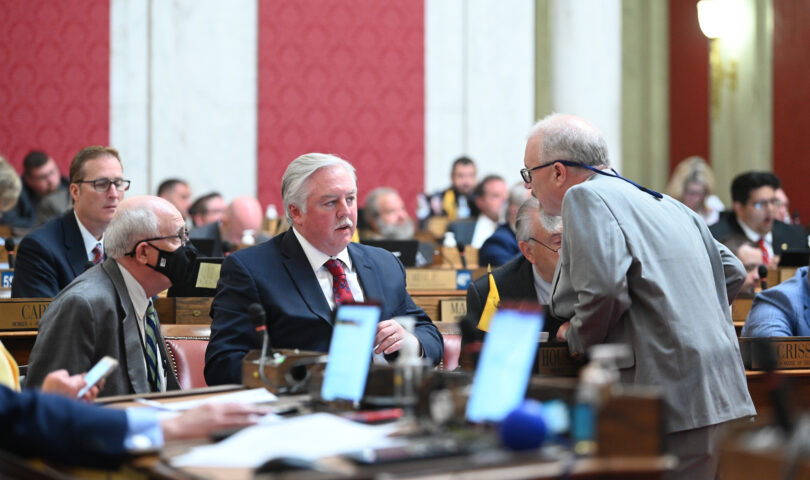MORGANTOWN — The House of Delegates spent a bit over an hour Tuesday morning debating a bill to create a new economic development fund — what some called the key bill of the two-day special session — before passing it overwhelmingly.
As Finance chair Eric Householder, R-Berkeley, explained it, SB 2001 closes an existing Board of Treasury Investments loan fund used for Economic Development Authority projects and creates a new revolving loan fund under the auspices of the EDA.
The new fund will be supplied with $143 million plus up to $600 million from surplus. The EDA will have to repay Treasury $107 million for the outstanding balance of the closed fund and will then be able to use the remainder for projects.
Out of the total, he said, at least $200 million will be used for new “high-impact” development projects that require EDA assistance of $50 million or more.
In addition, the bill creates a new $200 million Treasury fund for loans to the Department of Transportation. DOT will use the money for road projects eligible for federal funding under the Infrastructure Investment and Jobs Act and repay the loans when the federal reimbursements come in.
House leaders attempted to pass the bill in a single day on Monday, but some Democrats and Republicans defeated the effort to suspend the rules requiring a bill be read on three separate days.
So SB 2001 was on second reading Tuesday morning and delegates first defeated a proposed amendment adding some data reporting parameters.
After that, Majority Leader Amy Summers once again moved to suspend the rules so they could move the bill to third reading and pass it on Tuesday.
House rules say that kind of motion is not subject to debate and requires an up or down vote, but Speaker Roger Hanshaw admitted he erred on Monday in allowing debate on the motion to suspend the rules on the medical cannabis lab bill.
With that precedent, he allowed debate on this motion, and that debate went on for a long time.
Delegate Tom Fast, R-Fayette, said he’d voted against suspending the rules on Monday but now he had a clearer picture of what the bill can do, and changed his mind.
Delegate Lisa Zukoff, D-Marshall, said she supported suspending the rules on Monday and would do so again, but wished they’d had better information about the bill before the special session began, instead of rushing it through.
Delegate Pat McGeehan, R-Hancock, continued his opposition to fast-tracking the bill, saying it needed more review and objecting to a sentence near the end that exempts “any documentary material, data, or other writing made or received by the authority relating to high-impact development projects under this section (except for specified records, audits and annual reports) from the Freedom of Information Act.
Delegate Barbara Evans Fleischauer, D-Monongalia, shared McGeehan’s concern about transparency. “I don’t think there is a single person in this room or in this body that doesn’t want more jobs for West Virginians,” she said, but the bill needed careful vetting.
Her questioning got cut off, however. Most of the time on this debate was spent on the merits of the bill instead of the motion, and Hanshaw had already reined it in once. When a delegate objected to Fleischauer’s questions, he reined it in again.
Householder admitted, “It shields more information from the public.” But Delegate Daniel Linville, R-Cabell, said it merely mirrors what’s already in code.
They arrived at the time to vote on the motion and it passed 71-13, with opposition from both parties.
Turning to debate on the bill itself, Delegate Larry Rowe, D-Kanawha, expressed concern about the FOIA exemption but supported the bill, saying each project could create 500 jobs. “That’s transformative.”
The bill then passed 76-6, with 18 members absent. Fleischauer and one other Democrat voted no, along with four Republicans.
With that bill passed, the House joined the Senate in adjourning the special session.
Two bills on the governor’s call died. One was HB 213, the medical cannabis lab bill, which was never taken up on second reading; the other was HB 202/SB 2002, which would have exempted Bluefield State College from most aspects of Higher Education Policy Commission oversight.
TWEET David Beard @dbeardtdp
EMAIL dbeard@dominionpost.com




